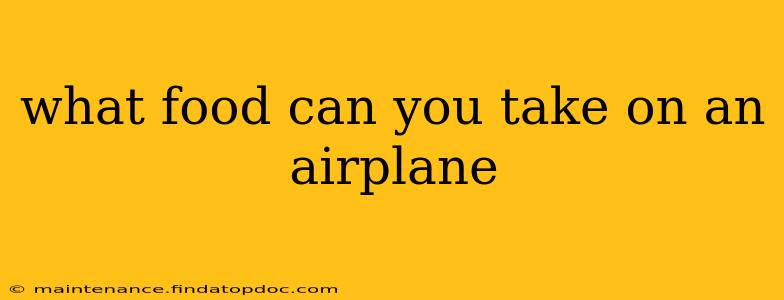Traveling by air can be stressful, and having a familiar, comforting snack or meal can make a big difference. But what food is actually allowed on board? The rules can be surprisingly nuanced. This guide will help you navigate the complexities of airplane food regulations and pack smart for your next flight.
What Foods Are Generally Allowed on Airplanes?
Most solid foods are permitted in your carry-on baggage. Think sandwiches, fruits, vegetables, crackers, granola bars, and even pre-made salads (though those can be messy!). The key is to pack them securely to prevent spills or leaks. Hard-boiled eggs are generally acceptable, but consider the potential for breakage. Dried foods like nuts and seeds are also excellent choices for their shelf stability.
What Foods Should You Avoid Bringing on a Plane?
While many foods are acceptable, certain items are better left at home. These include:
-
Liquids and gels: The TSA's 3-1-1 rule for liquids applies to food as well. Jams, jellies, yogurt, sauces, and similar items must be in containers of 3.4 ounces (100ml) or less, and all containers must fit inside a single, quart-sized, clear, plastic zip-top bag.
-
Foods with strong odors: Consider your fellow passengers. Avoid pungent foods like durian, strong cheeses, or anything with a particularly potent aroma that might bother others in close proximity.
-
Foods that could be considered hazardous: Sharp objects like knives or skewers used in food preparation should be left behind.
-
Foods that require refrigeration: Unless you're sure you'll have access to refrigeration during your journey, avoid perishable items that could spoil quickly, impacting both your experience and potentially others.
Can I Bring My Own Drinks on the Plane?
This depends on the airport and airline. While sealed bottled water is usually allowed, other beverages may be subject to the 3-1-1 rule for liquids. It's best to check with your airline before your flight to avoid any issues. Note that many airlines provide complimentary beverages on board.
What About Food Allergies?
If you have food allergies, it's crucial to inform airline staff and pack your own safe food options. Declare your allergies during check-in or booking and ensure you have enough medication to manage any potential reactions.
Can I Bring Food for My Baby or Infant?
Formula, breast milk, and baby food are generally permitted through security checkpoints, but you may need to declare them. They're often exempt from the 3-1-1 rule. It's always best to check directly with the TSA and your airline for the most up-to-date guidance.
What if I Have Dietary Restrictions?
Packing your own food is a great way to accommodate special dietary needs, such as vegetarian, vegan, gluten-free, or other restrictions. You can be certain of the ingredients and preparation methods.
What about bringing food from another country?
Regulations around bringing food into a country vary considerably. Check the customs regulations of your destination country before you travel. You may need to declare certain items and there are strict rules about bringing certain produce and meats across borders. Failing to comply can result in fines or even having the food confiscated.
By following these guidelines and checking with your airline and the TSA before you travel, you can enjoy a more comfortable and stress-free flight with your favorite foods. Happy travels!
